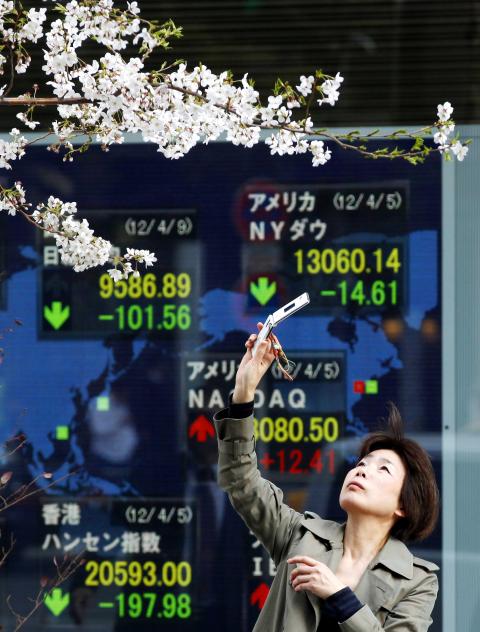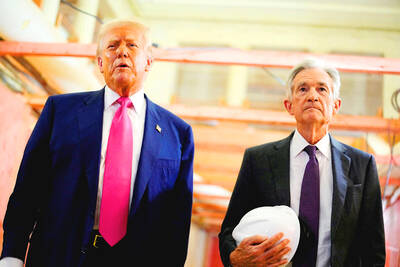Japan posted a current account surplus in February thanks to a stronger US economy, official data said, reversing a record deficit in January, although the figure was still down 30.7 percent year-on-year.
The latest reading, the broadest measure of Japan’s trade with the rest of the world, was largely because of rising shipments to the key US market, particularly vehicles, a positive sign for the world’s third-biggest economy.
“The recovery of the US economy, seen in its healthy new car sales, is contributing to the surplus,” said Satoshi Osanai, an economist at Daiwa Institute of Research. “Figures in January and February tend to swing for seasonal factors, such as the Chinese New Year [holiday], but a recovery from the Thai floods also helped Japan’s current account to swing back to a surplus.”

Photo: Reuters
Manufacturers with plants in Thailand were hammered by record flooding in the Southeast Asian nation last year, which came as domestic firms were recovering from Japan’s devastating quake-tsunami disaster in March last year.
In February, Japan’s current account stood at ¥1.18 trillion (US$14.48 billion), the Japanese Ministry of Finance said.
The figure was 30.7 percent lower than the same month a year earlier, but largely in line with a ¥1.15 trillion surplus tipped in a poll of economists by Dow Jones Newswires and the Nikkei Shimbun.
The current account measures the value of a country’s imports and foreign investments against the value of its overseas income such as exports of goods and services.
Overall, exports in the month were 2 percent lower, while imports grew 11.1 percent on soaring energy costs.
Japan has had to steadily increase energy imports as utilities turn on thermal power plants while atomic reactors stay offline amid public opposition following the Fukushima Dai-ichi nuclear power plant disaster.
Japan’s merchandise trade balance — a key component of the current account — came to a ¥102.1 billion surplus in February after four months in the red, the ministry said. That was still down 85.8 percent from a year earlier.
“Concerns over a stronger yen are receding gradually,” Osanai said. “Risks now are soaring prices for resources and a slowdown of the global economy, which would make a recovery of Japan’s manufacturing sector also slower.”
In January, Japan logged a record ¥437.3 billion current account deficit. That was its first deficit since January 2009, when it posted a then-record shortfall of ¥132.7 billion at the height of the global financial crisis.

IN THE AIR: While most companies said they were committed to North American operations, some added that production and costs would depend on the outcome of a US trade probe Leading local contract electronics makers Wistron Corp (緯創), Quanta Computer Inc (廣達), Inventec Corp (英業達) and Compal Electronics Inc (仁寶) are to maintain their North American expansion plans, despite Washington’s 20 percent tariff on Taiwanese goods. Wistron said it has long maintained a presence in the US, while distributing production across Taiwan, North America, Southeast Asia and Europe. The company is in talks with customers to align capacity with their site preferences, a company official told the Taipei Times by telephone on Friday. The company is still in talks with clients over who would bear the tariff costs, with the outcome pending further

NEGOTIATIONS: Semiconductors play an outsized role in Taiwan’s industrial and economic development and are a major driver of the Taiwan-US trade imbalance With US President Donald Trump threatening to impose tariffs on semiconductors, Taiwan is expected to face a significant challenge, as information and communications technology (ICT) products account for more than 70 percent of its exports to the US, Chung-Hua Institution for Economic Research (CIER, 中華經濟研究院) president Lien Hsien-ming (連賢明) said on Friday. Compared with other countries, semiconductors play a disproportionately large role in Taiwan’s industrial and economic development, Lien said. As the sixth-largest contributor to the US trade deficit, Taiwan recorded a US$73.9 billion trade surplus with the US last year — up from US$47.8 billion in 2023 — driven by strong

AI: Softbank’s stake increases in Nvidia and TSMC reflect Masayoshi Son’s effort to gain a foothold in key nodes of the AI value chain, from chip design to data infrastructure Softbank Group Corp is building up stakes in Nvidia Corp and Taiwan Semiconductor Manufacturing Co (TSMC, 台積電), the latest reflection of founder Masayoshi Son’s focus on the tools and hardware underpinning artificial intelligence (AI). The Japanese technology investor raised its stake in Nvidia to about US$3 billion by the end of March, up from US$1 billion in the prior quarter, regulatory filings showed. It bought about US$330 million worth of TSMC shares and US$170 million in Oracle Corp, they showed. Softbank’s signature Vision Fund has also monetized almost US$2 billion of public and private assets in the first half of this year,

POWELL SUCCESSOR: US Fed Governor Adriana Kugler’s resignation gives Donald Trump an opening on the board, potentially accelerating his decision on the next chair US President Donald Trump suddenly has a chance to fill an opening at the US Federal Reserve earlier than expected, after Fed Governor Adriana Kugler announced her resignation on Friday. It might also force him to pick the next Fed chair months sooner than he had anticipated. “The ball is now in Trump’s court,” LH Meyer/Monetary Policy Analytics Inc economist Derek Tang said. “Trump is the one who’s been putting pressure on the Fed to do this and that, and Trump says he wants to have his own people on. So now he has the opportunity.” Kugler’s exit unfolds amid unprecedented public pressure